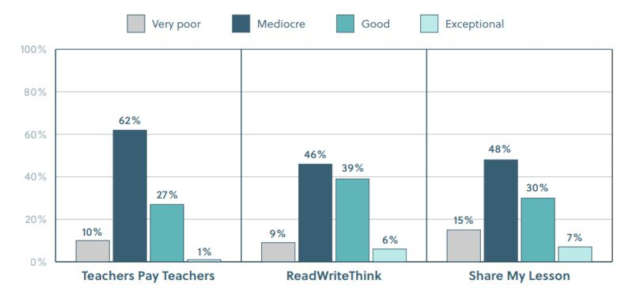Research Finds Supplemental Content for High School ELA Not Worth Using
- By Dian Schaffhauser
- 01/23/20
A recent report from the Thomas Fordham Institute found that lessons acquired through Teachers Pay Teachers and similar sites aren't worth using. The research, undertaken by University of Southern California Associate Professor Morgan Polikoff and educational consultant Jennifer Dean, focused on lessons and related supplemental content for high school English language arts. The project looked at 328 of the most popular downloads for three websites:
The big question they wanted to answer: "Are popular websites supplying teachers with high-quality supplemental materials?" "Sadly," the report announced, "the reviewers concluded that the majority of these materials are not worth using." Most earned either a zero or one on a zero-to-three scale.

Most materials available on the three websites evaluated received a poor or mediocre rating. Source: "The Supplemental Curriculum Bazaar: Is What’s Online Any Good?" from the Thomas Fordham Institute.
As explained in "The Supplemental Curriculum Bazaar: Is What’s Online Any Good?" the materials were evaluated (each item by two reviewers) in 10 areas:
-
Descriptive data;
-
Alignment to ELA standards;
-
Depth of knowledge;
-
Text complexity and quality (based on the quality of the writing, whether the text included grade level content and the importance of the text);
-
Close reading and evidence from the text;
-
Writing task quality;
-
Speaking and listening task quality;
-
Usability;
-
Assessment quality; and
-
Knowledge building and cultural responsiveness
The review process uncovered two "strengths": The content was "generally free from errors and well designed." And the quality of the text was "good to excellent," and students were "often asked to provide textual evidence when analyzing" the text. The report noted that while all three websites offered high-quality texts, the ones available through ReadWriteThink and Share My Lesson (both free sites) showed more "exceptional quality" than the ones from Teachers Pay Teachers (which has some free and some paid content).
However, more weaknesses were found than strengths. For example, the reviewers determined that most of the material was only "mediocre" or "probably not worth using"; and they only found "modest evidence" that the quality of the material would increase the likelihood of teachers using it. The mean score for content was 1.28 on that zero-to-three score. Two-thirds of the material wasn't "worth using."
Also, most of the materials reviewed (64 percent) were "weakly to moderately aligned" with the learning standards with which they claimed alignment.
Even though the quality of the texts themselves were "good," the quality of the rest of it — the writing, speaking and listening tasks — were "much weaker," rating an average score of 1.42.
The assessments made available were ranked poorly for a couple of reasons: Sometimes they failed to "cover key content"; and they "rarely" provided teachers with the kind of support needed to score the student work properly.
Nor did the materials do a good job of engaging students or reflecting cultural diversity.
The researchers concluded their report with the "hope" that the people creating the supplemental materials, which have become "an established part of the way that American teachers teach," would use the findings as a "clarion call to improve their quality for the betterment of teaching and learning."
The full report is openly available on the Fordham Institute website.
About the Author
Dian Schaffhauser is a former senior contributing editor for 1105 Media's education publications THE Journal, Campus Technology and Spaces4Learning.